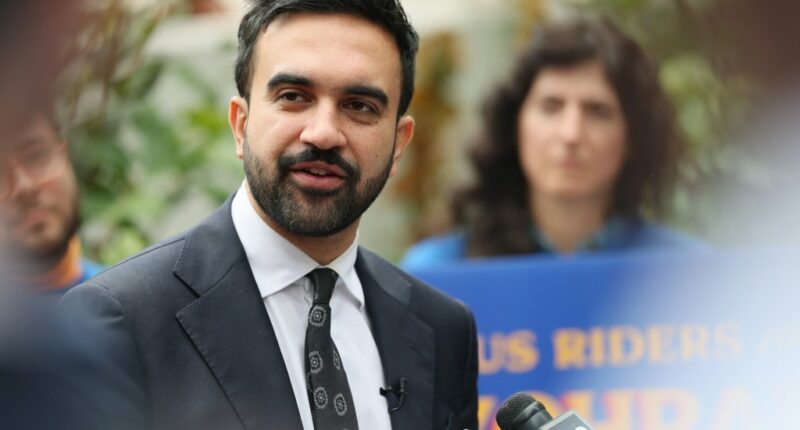Share this @internewscast.com

Recently, notable figures such as Sean “P. Diddy” Combs and Jeffrey Epstein have been publicly condemned for exploiting women and girls sexually. These incidents highlight how individuals can misuse wealth and power to target those who are vulnerable. Despite these revelations, mayoral candidate Zohran Mamdani advocates for the full decriminalization of prostitution.
Decriminalization involves not just removing penalties for those selling sex, but also abolishing criminal sanctions for those who manage, own, or engage in the commercial sex industry. Essentially, it could turn sexual exploitation into a thriving industry in a major city frequented by millions of tourists.
It is important to agree with Mamdani on one point: individuals who are being sold for sex should not face arrests. At World Without Exploitation, which is a leading anti-trafficking organization, the focus is on helping survivors — encompassing women, girls, LGBTQ youth, and people of color — who have suffered abuse, rape, and trauma from buyers and traffickers. These survivors require support, assistance, and ways to exit the trade, not legal punishment.
However, Mamdani’s proposed solution is deeply flawed. As a New York State assemblyman, he supports a bill that would entirely decriminalize sex trade activities, including the roles of pimps and sex purchasers. This approach is not progressive — it essentially benefits traffickers and those who exploit others.
The outcomes of this approach are predictable, as demonstrated by other countries that have implemented similar policies. Whether through total decriminalization (seen in New Zealand) or legalization (as in Germany, the Netherlands, and parts of Nevada), the results are markedly alike: an enlarged sex trade, increased trafficking, and more violence.
In both models, all aspects of prostitution become permissible — including the purchasing, selling, and advertising of sexual services. Brothels are considered businesses, and pimps are seen as “managers.” This shift impacts law enforcement’s capability to inspect and hold traffickers accountable. As a result, there is a surge in demand, which leads to greater coercion.
In places where the sex trade is legal or decriminalized, the illegal trade doesn’t disappear. In fact, it grows — because the legal market normalizes and increases demand, and there are never enough “willing” sellers to meet it. Traffickers step in to fill the gap.
Even worse, it becomes nearly impossible to obtain search warrants or arrest exploiters. That’s not justice — it’s abandonment. And it hurts the most vulnerable among us.
While proponents like Mamdani and the Democratic Socialists of America (DSA) use the term “decriminalization” to sound compassionate, make no mistake: what they’re proposing is more extreme than legalization. Full decriminalization eliminates all penalties for sex buyers, pimps, and brothel owners. And it does so without any regulations in place; not even a façade of protection for those in the sex trade.
The legislation Mandami supports also makes it harder to investigate and prosecute cases of sex trafficking because commercial sex establishments would become legitimate businesses, thus eliminating law enforcement’s opportunities to detect children and trafficking victims. Bluntly, it would make it easier for sex buyers to get away with purchasing sexual acts from a minor.
Many individuals caught in the sex trade are no longer legally children. But, they’re still young — often just out of foster care, escaping homelessness, or fleeing abuse. They’re disproportionately young women of color and LGBTQ youth.
In a world where sex buying is legal, these vulnerable populations are funneled into a system that treats their bodies as commodities — all to satisfy the demand of men who face no risk for buying them. For years, youth shelters in New York City have reported pimps recruiting young people into the sex trade.
This is not a victimless industry. The sex trade is inherently violent, and it thrives on inequality. Turning the Big Apple into a sex tourism hotspot isn’t progress. It’s exploitation dressed up as liberation.
Thankfully, there’s a better path for New York. The Sex Trade Survivors Justice and Equality Act would decriminalize only those being exploited, offering them exit services and support. This legislation is modeled on successful laws in countries such as Sweden, France and Canada. They target exploiters, not the exploited and recognize that those in the sex trade deserve dignity, care, and a way out — not laws that license their abuse.
Let’s not be fooled by catchy slogans. Full decriminalization isn’t about safety or freedom. It’s about profit, pure and simple. Profit for those who exploit. New York can, and must, choose a better path that protects all our families, our communities and society’s most vulnerable.
Zipkin is the policy director at World Without Exploitation and a former NYC prosecutor.

















